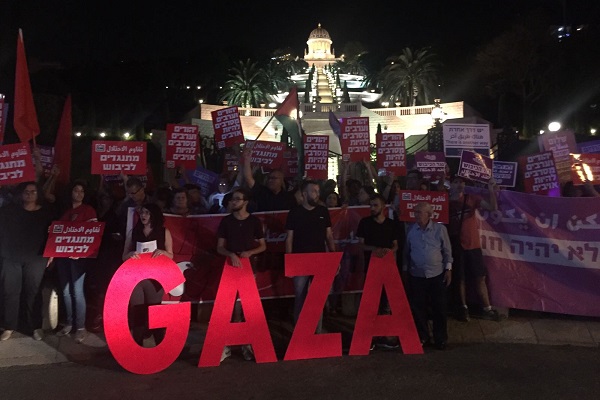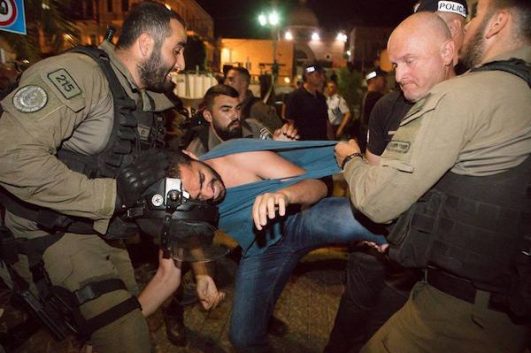The combined efforts of Palestinians in using their bodies, cameras, and voices to support detained protesters made it impossible for the police to hide the severity of their actions.

The release of 19 Palestinian citizens of Israel on Monday, who had been arrested since Friday, after police violently dispersed a demonstration in Haifa against last week’s mass killings in Gaza, is a fleeting speck in the context of recent events in the conflict. As the detained activists have emphasized, their experiences are nothing compared to what Palestinians are subjected to in the blockaded Strip. But after weeks of tragic news, the past three days have offered a moment of strength and hope that should not be overlooked.
The police’s response to Friday’s demonstration is hardly exceptional, even in the purported “capital of coexistence.” Harassment and repression are frequent features of political protests by Palestinian citizens, especially those in solidarity with Gaza. Last week, police launched “preventative” arrests and interrogations of several activists in their homes, hoping to deter them from participating in further demonstrations.
The courts, far from putting law enforcement authorities in check, routinely grant the police extensive impunity to keep protesters in detention and to avoid responsibility for their brutality, even when they clearly violate their own laws and regulations.
This past weekend, however, the protesters altered the rules of the game. Unfazed by the police’s repressive tactics, young and old activists and leaders returned to the streets in Haifa, and gathered outside the court to continue showing their solidarity with Gaza and with the detainees (including in the face of a right-wing demonstration calling to “return Haifa to Israel”).
Supporters from afar – including Palestinians in Gaza – shared images of Friday’s demonstration on social media, tying Haifa to the global discussion on Gaza. Volunteer lawyers worked around the clock preparing and strategizing their cases and legal arguments. Friends and family members filled the courtroom on Sunday for nine hours in support of the detainees, refusing to leave until the judge finally issued his decision at dawn.

These combined efforts of Palestinians and allies to use their bodies, cameras, and voices to defend the detainees – and the skills of the lawyers in harnessing those efforts in court – forced the Israeli police and the judge into a corner on Sunday night, making it impossible for them to hide the severity and arbitrariness of their actions.
As Hassan Jabareen, Adalah’s general director and head of the protesters’ legal team, said: “We succeeded to turn the courtroom from a space used against protesters into a space where police violence was exposed and rejected. This shift was possible due to social media, due to all of the videos, photos, and testimonies that were posted by the people that told the true story of what happened on Friday night.”
Monday’s outcome, therefore, should not be mistaken as a testament of Israel’s “rule of law.” Instead, it is a small but inspiring illustration of how grassroots power can challenge and shame the state institutions that are designed to crush it. Palestinian citizens have always exercised this resistance; but, given the worsening attempts by Israeli politicians, courts, and police to undermine their most basic rights in recent years, this latest mobilization feels even more significant.
The victory will undoubtedly be short-lived: protests will continue to be repressed, officers will continue to evade accountability, and the army will continue to open fire on the March of Return. Nonetheless, the past weekend in Haifa serves as an important reminder of what collective and targeted efforts can achieve. Just as importantly, it is a reminder that Palestinians in Israel will not be dissuaded from confronting the state for its oppressive policies against their people. Neither of those facts should be taken for granted.

